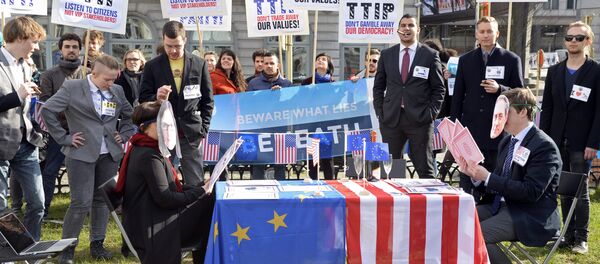They have involved representatives of major international corporations, but excluded labor unions, representatives of healthcare and education institutions as well as media.
Since the beginning of the talks, the European Commission has held only four meetings with public activists on the issue.
Until recently, the possible provisions of the deal were not made public. But even now, the 1600 pages document is very difficult to closely examine. It has no table of contents and explanations. Meanwhile, the document is scheduled to be signed in October.
Those criticizing the deal are concerned that the CETA deal includes some of the provisions from the TTIP deal with the US, an article in the Russian online newspaper Vzglyad read.
Priority of corporate interests over local legal norms will deliver a heavy blow to the European social-oriented economy.
The EU is one the global economic leaders while Canada is the 14th largest economy in the world. A simple trade deal between the EU and Canada would not significantly affect the European economy. However, experts found a detail in the text which would turn the CETA into a "Trojan horse" for the TTIP deal, according to the article.
The point is that the CETA would protect all corporations working in Canada. Thus, not only Canadian but also American and Chinese corporations could become part of the deal if they run business in Canada.
Now, after France and Germany openly expressed concerns over the TTIP, the CETA deal is a new chance for corporations to take control over the European market, the article read.
In May, the European Commission recommended approving CETA by vote in the European Parliament. However, opponents managed to oppose the decision.
In fact, French and German business elites recruited socialists, anti-globalists and human rights activists to protect the interests of national companies from international corporations.
Leader of the German socialists Vice Chancellor Sigmar Gabriel said that attempts to approve the CETA without discussions in national parliaments would be absurd. French far-left presidential candidate Jean-Luc Melenchon accused Juncker of trying to impose the deal "by force."
In June, French business elites and politicians struggled to pressure Brussels. Brexit dealt the final blow to Juncker. It was a sign that Britain does not want to get involved in the EU’s global projects, including the TTIP and CETA. Finally, Juncker adopted a mixed option for the CETA – before a vote in the European Parliament the document must be approved by the national parliaments of all EU members.
However, CETA has supporters within the EU. Some new members like the Czech Republic, Romania and Bulgaria have already reached visa-free agreements for their citizens with Canada. Moreover, Juncker is also committed to the deal.
He said that 98 percent of issues in the document are not in the jurisdiction of national parliaments and, thus, they can be discussed only by European trade ministers of the European Parliament. He also insists that the deal will be signed under any conditions in October and the main provisions will come into force in early-2017. Meanwhile, national parliaments will discuss the final two percent of the deal.






